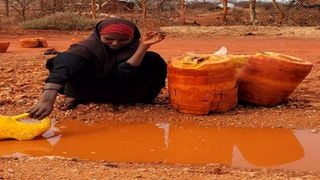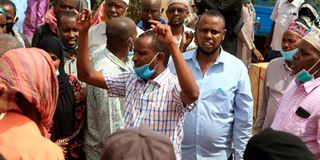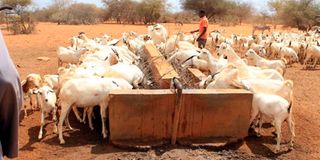
A woman fetches water from a trench in Mandera. The county has been hit by a water crisis following prolonged drought.
| James Kahongeh | Nation Media GroupNews
Premium
In Mandera County, every tick of the clock means life or death
What you need to know:
- Herders have to make treacherous journeys in search of water.
- And as they do this, danger lurks on the way that it is just by luck that they survive.
To Yahya Edin, every minute means life or death. When he leaves his home in Ardahalo village at dawn to drive his family’s herd to Darwed Borehole, 25km away in Takaba, Mandera West sub-county, Edin, 20, knows that every minute counts.
Many adversaries lie on the way. Animals could survive dehydration only to succumb to exhaustion. Bandits could also strike. He could also be taken ill.
Along this frightful route, the livestock have nothing to eat, thanks to a prolonged drought that has ravaged vegetation in this expansive county after two years of failed rains.
Grass is no more and even the hardiest of trees have given in. Red baking earth stretches for miles, with little sign of plant life. Rotting carcasses of cattle, camels, goats and sheep that lie all over are a testament to the devastating drought in the county.
But even after arriving at Darwed at midday, Edin’s animals have to wait, sometimes for up to four hours for their turn to drink. Here, a timetable is used to access the water trough. Usually, several thousands of animals are ahead in the queue.
For the herders and their animals, waiting is the most critical period in the cycle of this daring journey. Tens of emaciated animals die in the queue daily. Others are too thirsty they drink to their death. Here, fights erupt between the herders, sometimes with the price of life.
Edin must face these hazards to water his herd, being his family’s only livelihood.
After their fill, the animals rest before trekking back home. It will be two days and more than 50 kilometres before they can drink again.
When the county received below average rainfall in March last year during the long rains season, and no rains later in October during the short rains, herders panicked.
Brutal desert-like weather
Water pans have dried up. Some are too silted to hold any water. Boreholes in the county are also overwhelmed.
Women and children too are braving brutal desert-like weather and the risk of attacks from snakes, hyenas and lions to journey for miles in search of water for drinking.
Wild animals haven’t been spared either. Left with little to eat in the wild, baboons are raiding villages in search of food. Sometimes they steal food from households as human-wildlife interaction escalates.
In what’s perhaps the clearest depiction of desperation in this county, a group of women gather along the Dandu-Takaba Road, filling their containers with puddle water. It has just showered and the runoff, muddy or otherwise, is a relief to locals, even priceless.

Mandera East MP Omar Maalim (centre) on June 23, 2020 when he distributed water pump generators to 100 farmers affected by floods in the constituent along the River Daua.
The alternative is to walk for 20 kilometres, sometimes more, to the nearest water bowser-fed underground water tank.
In Banisa town, 75 kilometres to the north in Banisa sub county, anxious residents squabble at the town’s only water point. Banisa water pan, the town’s main water source, has dried up. A muddy patch in the middle, a few rotting fish and vandalised water pipes on the dam’s surface are the only evidence of the disappearing reservoir.
The look of indifferent concern on residents’ faces tells the story of a town in distress.
‘‘It’s only the third time the dam has dried up in 40 years. It has survived all the past droughts and residents have never lacked water,’’ says Mohamed Ali, Mandera County’s Executive for Water and Natural Resources.
For weeks now, bowsers hired by the county have trucked water to this town from tens of kilometres away. But for a settlement of about 30,000 people, three bowsers are merely a drop.
In case of breakdown, the bowsers can’t deliver water, further stretching the already calamitous situation.
On the day the Nation is visiting Banisa, Said Adam has missed water. He was late by a few minutes. But even a minute out could mean going for days without water.
Dramatic scene of desperation
‘‘I came here at 8am, but I was unlucky. The queue was already too long. I hope my neighbour will give us some for drinking,’’ the 18-year-old says.
His family hasn’t washed clothes for two weeks now. From the look of things, it might be several weeks before they can launder.
On a week when rehearsals for KCPE are supposed to be held, the candidate at Goljo Primary hasn’t set foot in school. Reason? ‘‘I’m the only person who can fetch water for my family.’’
Isn’t he worried about being ill-prepared? ‘‘Not at all,’’ he replies resignedly. With no water supply, the school sent learners away.
It’s only 11am at Wangaydahan Borehole in Mandera West sub-county, but the intensity of the sunshine makes it feel like 2pm. At one of Mandera’s largest watering points, it’s survival for the fittest.
A cacophony of threats and cries rent the air as herders clash for space. The armed security officers present seem out of their depth, even by the sheer number of herders here.

Goats drinking water at Kalengelesa watering point in Mandera County.
Meanwhile, animals shove and some are pushed into the drinking trough. Others are trampled to death. It’s a dramatic scene of desperation and agony, but also violence.
Billow Manoor is here to water his goats, having trekked for 28 kilometres from Bula Daadagituny, a neighbouring village. For weeks now, Manoor, like other herders, has watched helplessly as his herd perished one after the other.
Says he: ‘‘I had 300 goats, but 100 have died because of the drought. The animals are suffering.
Every time I leave home to come here, I lose several on the way.’’
Unpredictable rainfall patterns
Yet, the arid conditions haven’t dampened the enthusiasm to farm of Mohamed Kerrow and Abdi Hagiow in Banisa and Bula Impya respectively. Guavas, pepper, pawpaw, mangoes and lemons grow on their farms.
Four years ago, Kerrow sold all his livestock to cultivate his two-acre farm, a precarious move given the unpredictable rainfall patterns here. But soon he started making handsome profits from sale of fruits and vegetables to residents of Banisa town.
Until the rains failed last year. Now he’s regretting his investment decision.
Says Kerrow: ‘‘Fruits require a lot of water. I buy water from bowsers for between Sh15,000 and Sh20,000. Unless the National Irrigation Board and other government agencies support my farming project, I’ll soon lose my investment.’’
These days, Hagiow spends his time between worrying about his imminent fate and keeping baboons from destroying what remains of his fruit farm a few miles from Takaba town. Most crops here have withered. The resilient ones are fast drooping.
The dam he was relying on to water the crops is dry, and so is his underground tank.
‘‘The little water that is available is salty. When you use it, the plants die after a short time. I’ve spent all my savings trucking water from far to irrigate the farm,’’ he says.
Thankfully, the county has offered to supply Hagiow with water bowsers to salvage his business.
He will, however, have to fork out some money to fuel the bowsers. Either that or the collapse of his once thriving six-year business.
As drought persists in this county, death of livestock lurks by. Animals continue to die; many more will perish. So far, no human has been reported dead, although this could change. Unless it rains soon.





